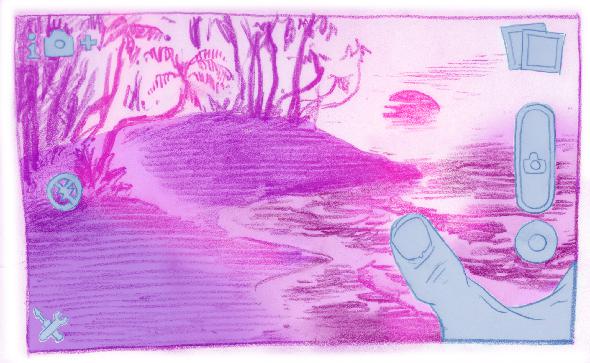On a recent Saturday, I sent 112 text messages. I refreshed my Facebook feed 40 times, Instagram 15, Twitter 26. I checked my email 37 times and streamed five episodes of The Good Wife on Amazon Prime. I placed a dinner reservation using OpenTable, perused the Slate mobile app, and disinterestedly swiped through Tinder. I used Google Maps to navigate to the grocery store, to dinner, and back home. Before falling asleep, I set my iPhone to vibrate, plugged it into the outlet alongside my bed, and placed it gingerly beside my pillow. I nuzzled up close to the smartphone—my most intimate companion—and drifted asleep, only to reach for him longingly the next morning.
Journalist Michael Harris is concerned about where this relationship is going.
As much as I tell myself I don’t need my smartphone, he’s clearly all I can think about. All he has to do is ping, and I drop everything to do exactly as he commands. He’s interruptive, needy, and suffocating. Also, frankly, his stamina isn’t what it used to be; I have to carry a charger everywhere these days. Sure, he tells me what I want to hear (via Spotify recommendations) and is thoughtful enough to remind me (via pop-up notification) when trash day is. But at what cost?
In The End of Absence: Reclaiming What We’ve Lost in a World of Constant Connection, Harris explores the consequences of a collective shift to online life. Through conversations with historians, psychologists, physiologists, and other experts, he confirms all our worst suspicions. The Internet is an incredible asset, but it also makes us lazy, distracted, and selfish.
However, Harris finds the most alarming part of this transition to be “the loss of lack.” Harris uses “absence” and “solitude” interchangeably throughout the book, but is fundamentally speaking to a dearth of time where we are alone with our own thoughts, singularly focused on our inner lives. He says that we do ourselves a disservice by being constantly connected. The Internet, even though it has the potential to permit meaningful communication, can also fill moments when it would be useful—perhaps even transformative—to reflect alone.
Harris believes that in order to operate at full intellectual and emotional capacity, we have to experience absence. In a hyperconnected world, it is too easy to reach for the crutch of outside stimulation or to think only in reference to public life. The tools at our disposal are formidable, offering us easy knowledge, approval, and entertainment. But the life that we make public via the Internet is too knowable. “We hold some part of the world at a distance,” Harris writes, “and since we are forever of the world, we end up holding some part of ourselves at a distance too.”
In order to reclaim absence, Harris commits himself to “Analog August.” For a month, he lives fully off the grid, filling his days with books, walks, and daydreams. (For research!) He is surprised to find that this reincarnation of a former life feels unnatural, even impermissible for a time. He has to relearn the things he used to take for granted, like wearing a watch and using reference books. He feels inefficient, bored, and sometimes indignantly lonely—“like a child who ran away from home and then was crushed to discover nobody noticed his disappearance.” The greatest lesson is exactly how much of his life was wrapped up in online technologies and how uncomfortable it felt to leave it all behind. But “if solitude feels painful,” Harris says, “it’s only because we don’t know how to be alone.”
In his Analog August, Harris is harkening back to an era that lives in his own memory: The time before the Internet. Like many other members of the “straddle generation,” those who have lived both without and with ever-connectedness, Harris is concerned about millennials. He worries that people like me, who have never known an unconnected life, will be unable to conceptualize the inherent value of absence. Instead of welcoming the void, kids these days will fill the blank space with cat videos and BuzzFeed listicles.
But I think Harris’s concern is misplaced. What many people don’t understand about millennials is that our intense connectedness causes us to place an even greater premium on solitude. Some of the happiest moments of my adolescence were spent in snoozy, screenless seclusion—lying on a blanket on my roof, listening to trains rumble by across the nearby river. In these instances I was able, as Harris hopes I remain, to center myself in space and time.
The thing is that people of my generation—the “digital natives”—experience true absence so seldom that it becomes exoticized, even fashionable, and turning off the smartphone is the ultimate indulgence. Of course, sometimes this is faux-authentic Instagram-your-new-vinyl nonsense. But enough of the time, it is genuine. We know the difference. As seductive as our gadgets are, they simply can’t deliver the feeling you get atop your roof on a breezy April night.

Photo by Hudson Hayden
Sometimes solitude even comes through the very technologies that threaten it. In the midst of all the texting and tweeting, technology has also been repurposed to unlock something that can rightfully be called solitude in the sense Harris understands it. Some folks meditate with the help of a YouTube video series; others unlock their reflective space with noise-cancelling headphones or apps like White Noise. Microsoft Word’s Focus mode leaves a writer with nothing but a blank page. Plugins and programs like SelfControl block potential distractions, allowing a user to be fully present in a single task. And despite the concerns of many straddle generationers, millennials often put away our gizmos and get out of the house. Some of us run, some of us paint, and some of us even read.
However, just because we can doesn’t mean that we always do—and this is not strictly generational. When watching a beautiful sunset, do you take in the moment or pick a photo filter? Even more importantly, if you choose the latter, do you do so consciously? “Every technology,” Harris says, “will alienate you from some part of your life. That is its job. Your job is to notice.” Harris’ Analog August and my quantifying of a recent summer Saturday serve the same purpose. They call attention to what is otherwise automatic and remind us not to get lost in the digital noise.
In his closing chapter, Harris asks what might come from all the silences we’ve been filling up. As I come to the close of a summer spent in a new city, I find myself coming back to Harris’ query. I choose to put away my smartphone for my commute now, and it certainly does feel like a luxury—a clarifying pause. With my headphones in, I would have missed the squeal of a schoolgirl telling her friend about a first kiss and the sound of the fountain in Dupont Circle. Scrolling my feeds, I would have missed the sartorial misadventures of the D.C. working crowd, and the gaggle of preschoolers that totter around the block single-file, holding onto a communal rope. Unplugging, even if only for brief moments, has permitted me to feel, even when surrounded by people, happily present and happily alone.
—
The End of Absence: Reclaiming What We’ve Lost in a World of Constant Connection by Michael Harris. Current.
See all the pieces in this month’s Slate Book Review.
Sign up for the Slate Book Review monthly newsletter.
